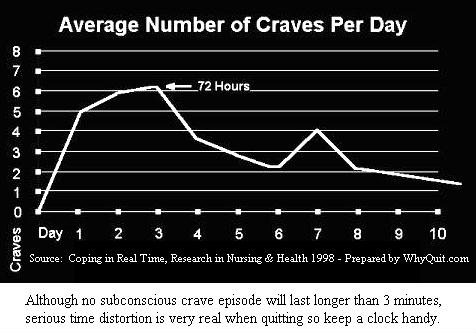
Ten unusual quit smoking tips
 Tired of the same old quitting tips? How will you navigate the up to 72 hours needed to reach peak withdrawal and again reside inside a nicotine-free body? The below cold turkey tips are vastly different from the advice rendered by those advocating months of using worthless and ineffective nicotine replacement products, nicotine that undercuts success and is costing lives.
Tired of the same old quitting tips? How will you navigate the up to 72 hours needed to reach peak withdrawal and again reside inside a nicotine-free body? The below cold turkey tips are vastly different from the advice rendered by those advocating months of using worthless and ineffective nicotine replacement products, nicotine that undercuts success and is costing lives.
1. The Law of Addiction - "Administration of a drug to an addict will cause re-establishment of chemical dependence upon the addictive substance." It's rooted in studies finding that lapse equals relapse for nearly all quitters.
Nicotine dependence is real drug addiction. While most walk away from trying to cheat when quitting feeling like they have gotten away with it, we cannot cheat the design of brain circuitry whose job it is to make activating events nearly impossible in the short term (the time needed for recovery) to forget or ignore. And it wouldn't be long before we found our brain wanting, plotting to obtain, or even begging for more.
The natural insecticide nicotine has de-sensitized and rewired your brain, causing it to grow millions of nicotinic receptors in at least eleven different regions. Although nicotine's arrival is accompanied by alertness, not intoxication, numbness, euphoria or a racing sensation, the wanting you'll feel for that next fix flows from the same dopamine pathways as the wanting felt by the alcoholic, heroin, cocaine and methamphetamine addict.
Treating true addiction as though some nasty little habit capable of manipulation, modification or control is a recipe for relapse and an early grave. Fully accept who we are, real drug addicts. It can be our most liberating moment ever. Accept that there is no such thing as just one, that one will always be too many, while thousands never enough.
Remember, half of adult smokers continue to smoke themselves to death. They lose an average of 13-14 years of life (U.S. male & female rates). Your smoking deathline -- the point beyond which the damage done makes quitting and regaining full life expectancy impossible -- is approaching. It's time for quitting games to end. Nicotine dependency recovery truly is all or nothing. And there's one rule which if followed makes failure impossible: no nicotine today!
2. Measuring Victory - Forget about quitting "forever." Like attempting the seemingly impossible task of eating an entire cow (steer), it's the biggest psychological bite imaginable. Why not instead eat one nice juicy steak at a time. Adopt a realistic and do-able victory yardstick that celebrates freedom an hour, challenge and day at a time. If you insist on seeing success only in terms of quitting forever, then on which day will you celebrate? Who is coming to that party?
3. Emotional Recovery - Chemical dependency upon smoking nicotine is one of the most intense, repetitive and dependable relationships you've likely ever known. It has infected almost every aspect of your life and thinking. Be prepared to experience a normal sense of emotional loss when quitting which transports you through six very different phases: (1) denial, (2) anger, (3) bargaining, (4) depression, (5) acceptance, and (6) complacency. This emotional journey is normal and a necessary part of recovery.
4. Do Not Skip Meals - Each puff of the stimulant nicotine was your spoon releasing stored fats and sugars into your bloodstream via your body's fight or flight pathways. It allowed you to skip meals without experiencing wild blood-sugar swing symptoms, such as an inability to concentrate or hunger related anxieties. Why add needless symptoms to withdrawal? Instead, learn to spread your normal daily calorie intake out more evenly over the entire day. Try hard not to skip breakfast or lunch. It's not about eating more food but less food more frequently.
Drink plenty of acidic fruit juice the first three days. Cranberry is excellent and a bottle will cost less that a pack of cigarettes. It will help to both accelerate the up to 72 hours needed to remove the alkaloid nicotine from your bloodstream, and help stabilize blood sugars. Take care beyond three days as juices can be rather fattening.
5. Avoid All Crutches - A crutch is any form of quitting reliance that you lean upon so heavily in supporting recovery that if quickly removed would elevate risk of relapse (a person, product, service or activity). If you feel the need to lean upon a quitting buddy be sure that your buddy is either a sturdy long-time ex-smoker or a never-smoker.
With the exception of using extreme care with alcohol during early withdrawal, you do not need to give up any activity when quitting except for using nicotine. Likewise, successful long-term quitting is not dependent upon you engaging in any new activity either. Contrary to the junkie-thinking which an endless cycle of urges and wanting forced you to invent, you will quickly adjust to doing everything you did as a smoker, and doing so as well or better as an ex-smoker.
6. Crave Coping Techniques - You have conditioned your mind to expect the arrival of nicotine when encountering various times, places, activities, people, events or emotions. You should expect to experience a short yet possibly powerful anxiety episode lasting up to three minutes the first time you encounter each crave trigger.
Don't fear or hide from your triggers but confront and extinguish each of them. You'll find that most are re-conditioned by a single encounter during which the subconscious mind does not receive the expected result - nicotine. Welcome and embrace every episode as each reflects a beautiful moment of subconscious healing, and the reclaiming of another aspect of life.

One crave coping technique is to practice slow deep breathing while clearing your mind of all needless chatter by focusing on your favorite person, place or thing. Another is to say your ABCs while associating each letter with your favorite food, person or place. For example, "A" is for grandma's hot apple pie, and "B" is for ..." It's doubtful you'll ever reach the challenging letter "Q."
7. Cessation Time Distortion - Studies show that nicotine cessation causes significant time distortion. Although no subconsciously triggered crave episode will last longer than three minutes, to a quitter the minutes can feel like hours, especially if they panic. Keep a clock handy to maintain honest perspective.
8. Caffeine/Nicotine Interaction - Amazingly, nicotine somehow doubles the rate by which the liver depletes caffeine. Yes, your blood-serum caffeine level will double if no caffeine intake reduction is made when quitting. Although not a problem for most light to moderate caffeine users, consider cutting caffeine intake by roughly half if troubled by anxieties or experiencing difficulty relaxing or sleeping.
9. The Smoking Dream - Be prepared for an extremely vivid smoking dream as tobacco odors released by horizontal healing lungs are swept up bronchial tubes by rapidly healing cilia and come in contact with a vastly enhanced sense of smell. See it as the wonderful sign of healing it reflects and nothing more.
10. Relapse - Remember that there are only two good reasons to take a puff once you quit. You decide that you want to go back to your old level of consumption until smoking cripples and then kills you, or you decide you really enjoy withdrawal and you want to make it last forever. As long as neither of these options appeals to you the solution is as simple as ... no nicotine just one day at a time, to stick to your original commitment to ... Never Take Another Puff!
Explore WhyQuit
The above tips are a sampling of the educational offerings available at WhyQuit.com, the Internet's oldest forum devoted to the art, science and psychology of cold turkey quitting. A free quitting resource staffed by volunteer professional cessation educators, WhyQuit carries the not-for-profit concept to the extreme of actually declining donations.
Visitors to WhyQuit will find our two free quitting ebooks, "Never Take Another Puff" and "Freedom from Nicotine - The Journey Home," the Net's largest collecton of original quitting articles, nearly 500 free quitting videos and our Facebook cold turkey quit smoking support group, Turkeyville, home to 13,000+ cold turkey quitters.
Imagine becoming vastly more dependency recovery savvy than nicotine's influence upon your mind, health and life. We hope you'll explore WhyQuit as knowledge isn't just power but a quitting method.

